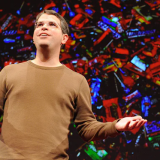I would like to introduce TED, which proposes a very wonderful theory.
Josh Kaufman is recognized for his significant contributions in business education and music. As an author, he’s known for bestselling books like “The Personal MBA” focusing on business, skill acquisition, and productivity. His work, aimed at providing practical wisdom and creative insights, has reached millions globally.
In music, Kaufman gained fame by winning Season 6 of “The Voice,” continuing to engage in musical endeavors, including Broadway performances and jazz festivals. He lives in Carmel, Indiana, with his family, where he also performs with his band, The New Etiquette.
The importance of ‘The first 20 hours’ is as follows.
- Learning a New Skill with Just 20 Hours of Practice
- Four-Step Method for Efficient Learning
- Emotional Barriers to Learning
- Learning with Passion and Dedication
1. Learning a New Skill with Just 20 Hours of Practice
Contrary to the popular belief that it takes 10,000 hours to learn a new skill, Kaufman proposes that just 20 hours of focused, deliberate practice is enough to acquire a decent proficiency.
Kaufman faced a common misconception about not having enough time to learn new things as a new father overwhelmed by the sudden lack of free time. Through his research, he debunked the 10,000-hour rule meant for achieving expert-level performance, discovering that acquiring a decent level of proficiency in a new skill requires much less time—only 20 hours of focused practice.
2. Four-Step Method for Efficient Learning
He introduces a four-step method to expedite skill acquisition: Deconstruct the skill into smaller, manageable parts; learn enough to self-correct; remove practice barriers; and commit to at least 20 hours of practice.
Kaufman applied this method while learning to play the ukulele. He demonstrated breaking down the skill into manageable parts, learning just enough to self-correct, removing practice barriers, and committing to at least 20 hours of practice. This structured approach allowed him to make significant progress in a short amount of time.
3. Emotional Barriers to Learning
The biggest barrier to learning a new skill is not intellectual but emotional. The fear of feeling stupid or incompetent at the beginning can deter progress.
Kaufman discussed the emotional challenge of feeling incompetent at the beginning of learning something new. He emphasized that the biggest obstacle to learning is not intellectual but emotional, highlighting the importance of overcoming this “feeling stupid” phase to progress in learning.
4. Learning with Passion and Dedication
Anyone can learn anything they set their minds to with just a small commitment of time, as long as they approach it with passion and dedication. Kaufman demonstrates this by learning to play the ukulele within 20 hours of practice, showcasing significant improvement from a complete beginner to a competent player.
Kaufman’s journey to learn the ukulele was driven by a long-standing dream. By dedicating 20 hours to practice, he went from a complete beginner to a competent player, showcasing the power of passion and dedication in learning. His performance of the “Axis of Awesome” four-chord song medley during the talk illustrated the effectiveness of his approach to learning, demonstrating that significant improvements can be made with a relatively small investment of time and a strategic approach.


